How to Support Reproductive Rights in a Post-Roe Era

Even before the Supreme Court’s leaked draft ruling on Dobbs v. Jackson Women’s Health Organization, many leaders and organizations in the reproductive rights movement were preparing for a post-Roe era. Now that the ruling is final, millions of people are realizing with horror, rage, and a new sense of urgency that the consequences for birthing people across the country will be immediate and severe. Nine states have already implemented bans on abortion in the first and second trimesters, 12 more are likely to enact similar bans or restrictions in the coming weeks, and an additional nine states’ positions are uncertain. While this decision will affect all people who are or could become pregnant, we know the impact is significantly greater for people with low incomes and pregnant people of color, who are more likely to seek abortions—and for whom traveling across state lines is often financially or logistically impossible. We expect that people of means and privilege will still be able to access an abortion, while those with systemic barriers will miss out on opportunities, career paths, and life experiences that should be available to everyone.
For many donors, the surge of attention and urgency on this issue has sparked a powerful desire to get involved. Indeed, Arabella has already been approached by numerous donors eager to make a difference but unsure how best to engage. We recognize that reproductive rights work can feel intimidating to new donors. However, organizations within the movement have seen such a ruling on the horizon for a long time and have long been preparing to support reproductive rights in a post-Roe world.
The following are best practices we recommend donors consider when entering the field of reproductive rights, as well as select organizations currently engaged in this necessary work that would benefit from support.
Think across the spectrum of support
We recommend that donors consider a three-pronged approach when working to achieve meaningful progress in the domain of reproductive rights. The first, direct service, focuses on providing direct contributions to nonprofits, service providers, and intermediary funds working explicitly on abortion access. Because abortion access is now a state issue, intermediary funds like the National Network of Abortion Funds and the Women’s Reproductive Rights Assistance Project are an effective way to channel donors’ dollars to local organizations in vulnerable communities. Likewise, the Liberate Abortion Campaign has already granted more than $800,000 to local abortion organizations, and it is preparing a rapid response to the Supreme Court’s ruling.
The second approach, movement building, prioritizes strengthening community power through regranting and capacity building. Here also, intermediaries connecting donors directly to grassroots organizers can help communities defend their own interests. Groundswell’s Catalyst Fund is specifically dedicated to resourcing reproductive justice efforts led by women of color, low-income women, and transgender and gender-expansive people, while the Third Wave Fund focuses on youth-led, intersectional movements.
Third, policy and advocacy work will be required to defend reproductive rights on the state and national levels. One priority for advocacy groups is lifting the Hyde Amendment, which bars federal agencies from providing funds that cover abortion. This restriction primarily affects those enrolled in Medicaid, which accounts for nearly one in six women of reproductive age in the country. All* Above All has launched an action plan for abortion justice at the local, state, and federal levels.
Explore out-of-the-box avenues
Direct, unrestricted funding to reproductive rights organizations is urgently needed, but this issue is complex, and it intersects with issues and causes that donors may already be supporting. For example, organizations like the Digital Defense Fund and The Forefront Project focus on providing legal expertise and cybersecurity services to reproductive rights organizations, an area that anyone who cares about safety should consider and that funders with connections in tech may be especially well positioned to support.
Other issue areas like paid family leave, anti-defamation work, civil liberties protection, and efforts to support a strong democracy are deeply intertwined with the issue of abortion access. For donors who already have a history of engagement in these fields, it is well worth exploring what strategies the grantees you already engage with are taking in this moment.
Prioritize intersectionality
It is essential that the reproductive rights movement recognizes that those closest to the problem are closest to the solution. In the United States, those closest to the problem of abortion access are overwhelmingly people of color. Black, Indigenous, and people of color—and Black women in particular—experience medical discrimination, higher rates of maternal mortality, and greater income inequality than their white counterparts. Restricting abortion access only compounds these factors, further entrenching systemic racism.
As new donors enter the reproductive rights space in the wake of the Supreme Court decision, they should be thoughtful and intentional about supporting, funding, and taking their lead from Black birthing people and others who will live the consequences of this decision. One organization with these voices at its core is Sister Song, which works to achieve reproductive justice for Indigenous women and women of color by eradicating reproductive oppression and securing human rights.
Witnessing the roll back of once-established gains in gender equity and bodily autonomy is incredibly dispiriting. It also makes clear that the work of mission-aligned organizations and funders in this moment is critically important. While we have highlighted a limited number of organizations doing important and powerful work in this space, this field is filled with far too many changemakers for us to mention them all here. If you wish to learn more and connect with them, please reach out.
Jessica Robinson Love is a managing director in Arabella’s San Francisco office where she partners with foundations, corporations, families, and individuals to advance social change. Her work has included helping to rapidly scale a campaign to eliminate barriers to women obtaining contraception and developing a strategy for a national parent education initiative to advance student success, among other initiatives to propel social change.
